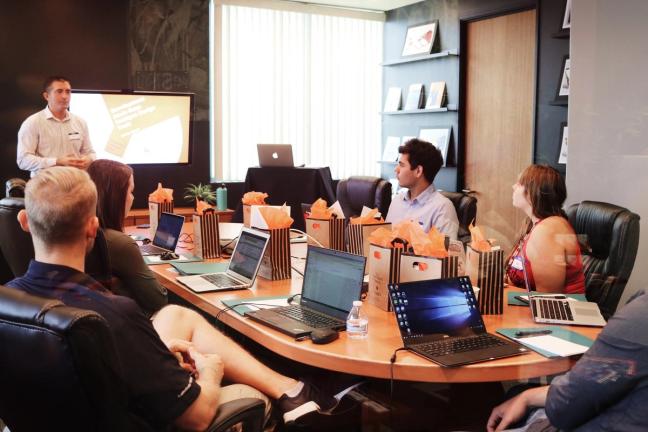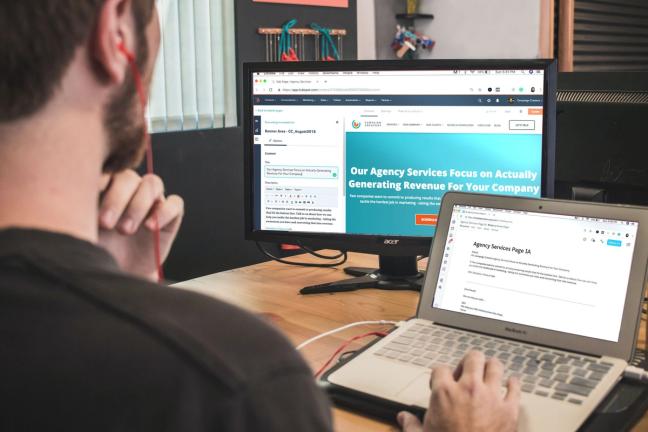Picture those pre-pandemic days (you can do it; just close your eyes, furrow your brow and squint really, really hard). Back in those days, you’d land a stellar grad job or embark on your vocation — whether medicine, law or education oriented — and that would be that. You’d be sorted for life. Done, dusted and with your life plan neatly mapped out in front of you.
But now, things are different. Due to a combination of Covid-19 and millennial insistence that ‘there must be something better out there’, the work landscape is changing. Millennials are changing career paths left, right and centre. There’s far less inclination to settle for less, and far greater motivation to find a role that’s nothing short of perfect.
"The work landscape is changing..."
A ‘perfect’ job is a tall order, of course; but that’s where recruiters come in. As we emerge out of the pandemic-sprung woods with newfound clarity about just what, exactly, we want to do with our lives, recruiters are likely to see a gargantuan increase in demand; and so we’ve collated a list of the top ten questions you should be asking every recruiter, for when you — inevitably — decide to discover your true calling. (Assuming you haven’t already found it, of course; in which case we take our proverbial hat off to you.)
#1 What changes do I need to make to my CV?

Note our wording, gents. Not ‘do I need to make any changes?’, but ‘what changes do I need to make’? It doesn’t matter how phenomenally impressive your CV is; you’ll need to adapt and amend it for every role you apply for, to ensure it’s as eye-catching as can be for that particular company and that specific job.
You can retain the basic structure and content, of course (we’re not suggesting you immediately dash off to volunteer on the other side of the globe just to land the grad job of your choice), but your recruiter will know which elements of your CV you need to highlight and prioritise in order to make you stand out within the field you’re interested in; and then they’ll be able to advise on further, more specific alterations when it comes to applying for specific jobs.
#2 What do you know about the company?

Let’s say you’re interested in applying for a role: in which case, knowledge of the company is key. Company culture is everything, and it’ll affect your entire experience of the role. You need to know exactly what you’re walking into, and the recruiter is your eyes and ears, in this regard. Ask them for an honest, accurate assessment of the company and its culture — you won’t regret it.
This could be anything. How young or old is the company? How do they prioritise work/life balance? What’s the social element like? What are their distinguishing features — do they feel particularly strongly about caring for employee mental health, or about promoting diversity? What are their core ethics and values? The answers to all these questions will affect your time in the role; so you’ll want to ensure they’ve been answered before you even stroll into the interview.
#3 What is the company looking for?

It’s crucial to know what the company’s like; but it’s also vital to understand what they’re seeking in their employees. Hopefully, that’ll be you down to a tee — and that’s good, confidence-building knowledge to have as you go into the interview.
But there’s a chance that you and the company in question may not be remotely aligned; in which case, it’s better to know that now (rather than when you’re several ice cream tubs in, shrouding yourself in disappointment and comfort food after you didn’t get the job you really, really wanted). You’ll need to know exactly what they’re after. If you know they’re looking for someone of your exact description, that’ll give you the confidence you need to smash the interview out of the park. But if they’re looking for your polar opposite (in terms of background, skills and priorities), there’s no point in wasting your time.
#4 What are the strongest elements of my application?

You need to know this, gents; because it’s those strong elements that will help you blow the socks off the interview team. Chances are, you’ll have a good idea of what your strengths are already; but there’s always a chance that something you’ve previously dumbed down or modestly brushed off is your strongest ally.
Once you know exactly what your strengths are, you can lead with those. You can bump them to the top of your cover letter, and put them in pride of place on your CV. And, most importantly, you can keep drawing the interviewer’s attention to them in that all-important interview. Whichever question you’re asked, you can find a way to bring it back to your strengths; and that’s the kind of thing that’ll get you the job.
#5 What are the weakest elements of my application?

This might be a bitter pill to swallow, depending on how many weak areas you have (and just how weak they are); but it’s a vital prescription if you want to land that job. We all need to have a strong understanding of our weaknesses, because that’s how we can work on them. You can only work with what you know, after all.
Once you’re aware of any weak areas in your application (which could be along the lines of less experience than is desirable in a certain area), you can put in some damage control. You’ll have a ready made answer for that typical interview question (‘what are your greatest weaknesses?’), and you’ll be able to reassure your interviewers firstly that you’re very much aware of the weakness in question, and secondly that you’re actively working to fix it. That cements you as a self-aware, proactive sort of chap; both attributes that’ll stand you in good stead when applying for jobs.
#6 What is the career progression like?

Ah, the age-old question. The phrase ‘career progression’ gets bandied around a lot; but this really is something you need to know. If you’re going to be stagnant for years, watching your friends get promoted left, right and centre while you’re still on an entry-level salary: that’s the sort of thing you need to know now.
Of course, it might not be like that; the company in question might be excellent at promoting their employees in good time. But it’s still a good idea to have a sense of what your life will look like if you take this job. It’s important to know what you’ll likely have to do, in order to get promoted — which targets you’ll have to hit, and so on — and it’s wise to have an idea of where you might be in ten years’ time. (Then again: if the pandemic’s taught us one thing, it’s that you can’t — and probably shouldn’t try to — predict anything).
#7 Is there any room for salary negotiation?

Remember, gents; the best possible time to negotiate your salary is while you’re being appointed. If they’ve decided they want you, you’ve got the upper hand. It’s always worth asking if the salary can be upped a notch (or five) — but your recruiter will know whether it’s a point worth pushing, and what the boundaries are.
Your recruiter will (hopefully) have useful knowledge on what to ask for, and how to ask for it. It’s always a question worth asking — know your worth, gents — but your recruiter should be able to advise on exactly how to go about this tricky business we like to call ‘money management’.
#8 Are you going to recommend me?

This is a question that many might not think to ask. After all, if you’re having a conversation with a recruiter about a role, it’s easy to assume that they’ll be putting you up for the job. But that’s not always going to be the case; and in that instance, you need to know why.
A recruiter will want hiring managers to think well of them, so they’re likely only going to suggest people that they think are ideally suited to the role, or who stand a strong chance of being considered. If neither of those is you, you need to know about it; and you need to know why. Your recruiter will be honest with you if you ask the blunt questions; so go forth and ask.
#9 What can I expect from the interview process?

Always be prepared. It’s not cheating; it’s just using the resources you have available to the best of their potential. If your recruiter is able to give you a level of insight into the questions that will be asked and the form the interview will take, that will take the pressure off you — no one likes the unexpected — and you’ll perform better.
Preparation is your greatest asset when applying for a role. If there’s a likelihood that you’ll need to do a presentation as part of the application process, that’s something you’ll want to know about as early as possible; and even a small thing like being aware of how many people will be on the panel can help you navigate those tricky, treacherous interview curveballs.
#10 How long have the company been looking to fill this position?

According to Indeed, this is one of the most important questions you can ask — because it gives you an insight into three key things. Firstly, it’ll tell you how likely you are to get the job. Secondly, it’ll tell you how selective the hiring manager is; and thirdly, it’ll tell you if there are any notable challenges associated with the role.
If the job opening has just gone live, you’ll know that you’re one of the first people they’re seeing, which can maximise your chances — if it’s been open for a while and they’ve seen many, many people before you, that means you’ll have to measure up to those who’ve gone before (always a tricky task). Equally, if it’s been open for many weeks, that could indicate a particularly selective hiring process — which means you’ll have many specific criteria you’ll likely have to meet — or that there are some issues you need to be aware of, within either the job or the company, that could be dissuading applicants.
Either way; the length of time in which the job has gone without being filled can be a telltale sign of paramount importance; and it’s those sorts of signs that are worth listening to.
So how will you spend your money, when you land the job of your dreams? Why not start by stepping inside the most expensive house on the Upper West Side…
Become a Gentleman’s Journal member. Find out more here.

Become a Gentleman’s Journal Member?
Like the Gentleman’s Journal? Why not join the Clubhouse, a special kind of private club where members receive offers and experiences from hand-picked, premium brands. You will also receive invites to exclusive events, the quarterly print magazine delivered directly to your door and your own membership card.
Further reading

Nearly all customers of FTX will allegedly get their money back, plus interest. How is that possible?

The stuff of dreams: this may be the greatest mattress you’ll ever sleep on
